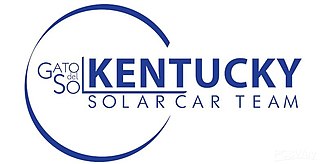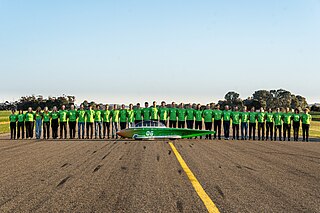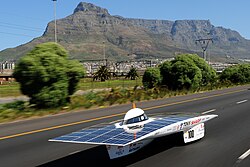
The World Solar Challenge (WSC), since 2013 named Bridgestone World Solar Challenge, is an international event for solar powered cars driving 3000 kilometres through the Australian outback.

Nuna is the name of a series of crewed solar powered race cars that have won the World Solar Challenge in Australia seven times: in 2001, 2003, 2005, 2007, 2013, 2015 and 2017. The vehicles are built by students who are part of the "Brunel Solar Team" at the Delft University of Technology in the Netherlands, sponsored by Brunel.

The American Solar Challenge (ASC), previously known as the North American Solar Challenge and Sunrayce, is a solar car race across the United States. In the race, teams from colleges and universities throughout North America design, build, test, and race solar-powered vehicles in a long distance road rally-style event. ASC is a test of teamwork, engineering skill, and endurance that stretches across thousands of miles of public roads.

The Nuna 3 is a solar car developed by Nuon Solar Team form the Delft University of Technology in 2004-2005 for the 2005 World Solar Challenge.

The Victorian Model Solar Vehicle Challenge is a competition held annually at Scienceworks in Melbourne, Australia. The challenge gives school age children a chance to design and build a car or boat, and more recently a Mars Rover, that operates solely on solar power. It is run by MSV, a voluntary organisation created to administer the challenge.
The Solar Car Challenge is an annual solar-powered car race for high school students. The event attracts teams from around the world, but mostly from American high schools. The race was first held in 1995. Each event is the end product of a two-year education cycle launched by the Winston Solar Car Team. On odd-numbered years, the race is a road course that starts at the Texas Motor Speedway, Fort Worth, Texas; the end of the course varies from year to year. On even-numbered years, the race is a track race around the Texas Motor Speedway. Dell sponsored the event from 2002-2008. Hunt Oil Company sponsored the 2010 race. Oncor sponsored the 2024 race.

A solar car is a solar vehicle for use on public roads or race tracks. Solar vehicles are electric vehicles that use self-contained solar cells to provide full or partial power to the vehicle via sunlight. Solar vehicles typically contain a rechargeable battery to help regulate and store the energy from the solar cells and from regenerative braking. Some solar cars can be plugged into external power sources to supplement the power of sunlight used to charge their battery.
Solar car racing refers to competitive races of electric vehicles which are powered by solar energy obtained from solar panels on the surface of the car. The first solar car race was the Tour de Sol in 1985 which led to several similar races in Europe, US and Australia. Such challenges are often entered by universities to develop their students' engineering and technological skills, but many business corporations have entered competitions in the past. A small number of high school teams participate in solar car races designed exclusively for high school students.

The Midnight Sun Solar Rayce Car Team is a Canadian solar car race team affiliated with the University of Waterloo of Waterloo, Ontario. Founded in 1988, the Midnight Sun team is a student-run organization which designs and builds a solar vehicle every two to three years to compete in two solar challenges; the World Solar Challenge, held in Australia, and the American Solar Challenge, held in the United States.

The University of Kentucky Solar Car Team is an independent, student-led project that operates as part of the University of Kentucky College of Engineering. The team's primary goal is to compete in the American Solar Challenge and the Formula Sun Grand Prix over the summer, but they also perform outreach events in which they display and discuss their car with nonmembers.
Nuna 1 was a car powered by solar power, developed by students from the Delft University of Technology.

The Nuna 5 is the 2009 model of the Nuna series solar-powered racing car built by the Dutch Nuon Solar Team.
Nuna 2 is the name of a solar powered vehicle that in 2003 won the World solar challenge in Australia for the second time in a row, after the Nuna 1 victory in 2001. The Nuna solar racers are built by students who are part of the Nuon Solar Team at the Delft University of Technology.

Tokai Challenger is a solar car from the Japanese Tokai University. The Tokai Challenger became the winner of the 2009 and 2011 World Solar Challenge, a race for solar cars across Australia. The car is designed and tested in collaboration with students and with the help of professor Licas Lofaso from Tokai University and several Japanese companies in the automotive industry.

Blue Sky Solar Racing is a student-run team at the University of Toronto that designs and constructs solar powered vehicles to race in international competitions.
Nuna7 is a solar-powered racing car in the Nuna series built by the Dutch Nuon Solar Team. The team finished first with Nuna7 at the World Solar Challenge 2013, a race of 3000 km through the outback of Australia. The Nuon Solar Team consisted of 16 students of Delft University of Technology.
SolarMobil Manipal is the official Solar Car student team of Manipal University, Manipal, India. The team, founded in 2011 by a group of engineering students of Manipal Institute of Technology, is the third Indian solar car team and the first Indian team to build a passenger solar car. SolarMobil is a student project aimed at research & development of solar powered electric vehicle.

Stella and its successors Stella Lux, Stella Vie and Stella Era are a series of solar racing family cars, built for the World Solar Challenge in Australia, sofar winning its Cruiser Class all four times it was held – in 2013, 2015, 2017 and in 2019. Stella is considered the world’s first solar-powered family car and was given the 'Best Technology Development' Award at the 8th annual Crunchies in San Francisco in 2015. Being the only competing vehicle with a license plate, the road registration of Stella contributed to the winning score in the races. The vehicles are designed and built by "Solar Team Eindhoven" (STE) — some 26 students of different faculties of the Eindhoven University of Technology (TU/e) in the Netherlands. The group have set up a non-profit foundation to promote their concepts for practical solar vehicles for adoption on a broader scale.

Sonnenwagen Aachen is a current project by students from RWTH Aachen University and FH Aachen for the development and construction of a solar car, to participate in the World Solar Challenge in Australia. The solar car race with a length of 3022 km from Darwin in Northern Territory to Adelaide in South Australia is known to be the longest solar car race in the world and has celebrated its 30th anniversary in October 2017.

Top Dutch Solar Racing (TDSR) is a student solar racing team from Groningen, the Netherlands. It was founded in February 2017 and participated two times in the challenger class of the Bridgestone World Solar Challenge (BWSC) for the first time in 2019. In 2021 Top Dutch Solar Racing built its second solar car and competed in the Moroccan Solar Challenge. In 2023, Top Dutch Solar Racing participated in the BWSC again with Green Thunder, the third solar car.



















